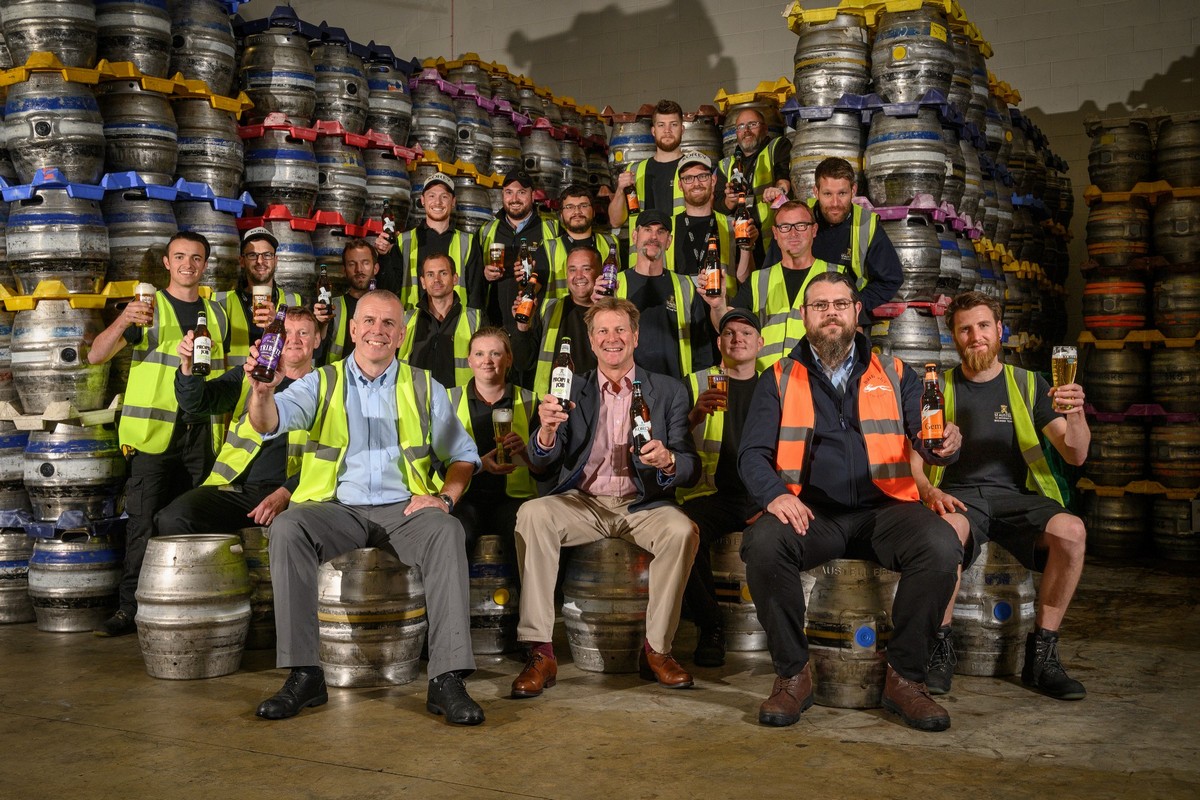Roger Ryman, who joined St Austell Brewery in 1999, and who played a key part in transforming the Cornish company’s fortunes, has passed away, it has been announced. He had been fighting cancer, the brewery said this morning.
It’s a sad moment, and a great shock to a British brewing industry which owes him a lot in the way he went about his 21-year career at St Austell. This was a company rejoicing in the nickname ‘St Awful’ when he joined it, a nod to its repitation for bland, unopular beers which were doing its pubs no favours.
He arrived in 1999 as Cornwall was in the midst of Eclipse fever. I remember it well as I was asked to co-ordinate coverage of the event in local newspapers. To start his time with St Austell, he created an Eclipse special called Daylight Robbery. This proved to be so popular that the decision was taken to add it to the core range, but with the name Tribute, a nod to Cornwall’s mining history. The tribute system was a way of miners earning a proportion of the value of the core they dug out.
From there, the pale ale brand just grew and grew to the market domination it enjoys today, contributing to St Austell’s now much healthier profits, and bank rolling projects such as the small batch brewery, which has not only created some outstanding experimental beers over the years, but also nurtured the talents of many of St Austell’s highly-skilled brewing team.
With Tribute launched and growing, Roger had the bit between his teeth to turn St Austell into the brewery which would not only pick up stacks of British awards but also an impressive haul of international beer accolades. A trip to the hop-growing farms of America and a friendship with Karl Ockert, head brewer at BridgePort Brewery, in Portland, Oregon, led to the creation of the first small batch of Proper Job in 2006, based upon Karl’s BridgePort IPA of the same (5.5%) ABV.
I always berated Roger with the opinion that Proper Job, rather than Tribute, should be St Austell’s flagship beer (it was a long-running joke, really — I can see the marketing logic in it being Tribute). It has been a huge award winner for the brewery, though, available on draught at 4.5% ABV, but so much better in bottle at 5.5.% ABV. It’s now in cans, too.
Roger was particularly proud, too, of Russian imperial stout Black Square, which started out as a colaboration with Moscow’s New Riga’s Brewery and went on to be named the world’s best strong beer at last year’s International Brewing Awards. The award-winning partnership resulted in Black Square being released in keg into the Russian market. It quickly became one of New Riga’s best-loved craft ales and remains a best-seller to this day. His eagerness to work with other brewers was never-ending. For Roger, there was always something new to learn from others in his industry.
When St Austell purchased Bath Ales in 2016, Roger was keen to install a new brewery and took a very hands-on approach to make sure the project was done correctly. He gave beer writers a facinating tour when the new faciity opened in 2018, and seemed extremely proud of the end result. Without the growth of St Austell as a company, though, acquisitions such as Bath Ales and its estate wouldn’t have been possible.

Roger with the brewing team and former chief executive, James Staughton, in June 2019, as the brewery celebrated a production record of 150,000 brewer’s barrels in a year
The annual St Austell Celtic Beer Festival, which Roger helped to establish not long after he arrived at the brewery, has turned into a must-attend annual event for beer aficionados, and draws visitors from across the country. It is notable not only as a huge fundraiser for the brewery’s charitable trust, but also for showcasing the skills of Roger’s brilliant brewing team, who are given free rein to develop special brews that may go on to become permanent fixtures in the St Austell portfolio, or at least popular small-batch releases.
In an interview last year, Roger explained that his philosophy of brewing was the same as it is for food. “If seafood is so good, it is because the fish you serve is fresh. The chef is only there to enhance and expose the flavour. My view around brewing is the same. The quality of the beer is inherent to the quality of the ingredients and how they are grown. Our task as brewers is to gently and sympathetically expose the flavours.” To this end, he was a huge supporter of Maris Otter barley, which he considered the best quality malt across a series of disciplines.
Roger grew up in Leeds, the son of a university lecturer and a school teacher. When he was old enough, he took his passion for the great outdoors and got a summer job on a farm, but the brewing spark had already been ignited with the use of a Boots brewing kit when he was 14. He studied agricultural science at Newcastle University and got his first brewery job in that city, as a lab technician. After a year he decided to go travelling, ended up in Canada, and returned with a wife, Toni, to whom he was clearly devoted.
They went to Edinburgh in 1993 where Roger undertook a masters degree in brewing, then he worked for a malt extract company before joining McClay’s Brewery in 1996. He had ambitions there to be head brewer, but when that didn’t work out he looked for jobs elsewhere before spotting and applying for the St Austell vacancy. He described taking the job, after a second interview, as a leap of faith. It was, however, to prove the making of him, and to redefine St Austell as a world-class brewery.
Roger was a beer writer’s dream brewer. He was always open and honest, always ready to make time for you, and always boyishly enthusiastic about the newest piece of kit the brewery had installed, or the plans for a new beer release. Fellow members of the board have been honest in acknowledging how he helped to build St Austell into the incredible brand it is today, with a terrific range of beers and a growing estate of pubs featuring some of the most iconic properties in the country.
Roger leaves a huge legacy, in brewing and in Cornwall — among his interests he had been a keen gig rower, and retained his love of country walking. He’d often turn up in my local for a Penzance Brewing beer, having hiked for a few miles around West Penwith. He was terrific company, with time for everyone, and an uncanny knack for producing unforgettable beers. He will be greatly missed.

